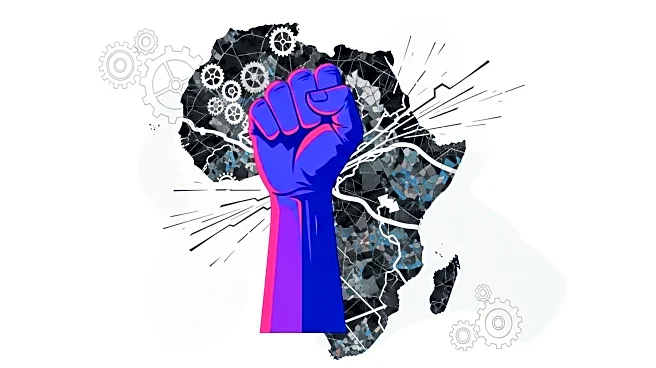What's Happening?
Youth-led protests are sweeping across various African nations, driven by Generation Z's frustration with longstanding governance issues. In Madagascar, protests erupted over water and electricity shortages, leading President Andry Rajoelina to dissolve his government. Despite this, demonstrators continue to demand his resignation, citing poor governance and corruption. The protests have been marked by severe repression, with reports of security forces using tear gas and live ammunition, resulting in at least 22 deaths according to the United Nations. Similar movements are occurring in Kenya, Togo, and Morocco, where young people are rallying against economic hardships, political repression, and inadequate public services. These protests are largely organized through social media platforms, reflecting a global trend of youth activism inspired by similar movements in Asia and Europe.
Why It's Important?
The protests highlight a significant generational shift in political engagement across Africa, with young people leveraging technology to organize and amplify their demands. This movement underscores the growing discontent among Africa's youth, who face high unemployment rates and deteriorating living conditions. The protests could lead to substantial political and social changes, as governments are pressured to address the grievances of a tech-savvy and informed generation. The outcome of these protests may influence governance and policy reforms, potentially reshaping the political landscape in affected countries. The international community is closely watching these developments, as they could have broader implications for regional stability and economic growth.
What's Next?
As the protests continue, governments in affected countries may face increased pressure to implement reforms and address the demands of their young populations. The use of social media as an organizing tool suggests that these movements could gain further momentum, potentially leading to more significant political changes. Observers will be watching for any concessions or policy shifts from governments, as well as the potential for further unrest if demands are not met. The international community may also play a role in mediating and supporting efforts to address the underlying issues driving these protests.
Beyond the Headlines
The protests reflect deeper systemic issues within many African nations, including corruption, inadequate public services, and economic inequality. The involvement of Generation Z, who are adept at using digital tools, marks a new era of activism that could challenge traditional power structures. This movement may inspire similar actions in other regions, as young people worldwide become increasingly vocal about their dissatisfaction with the status quo. The protests also raise questions about the role of technology in modern activism and its potential to drive social and political change.










